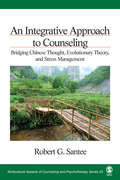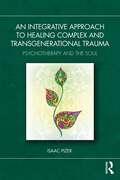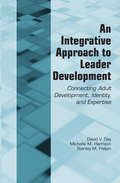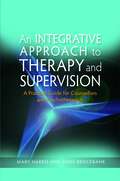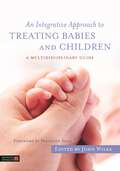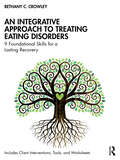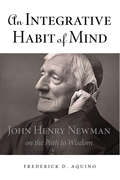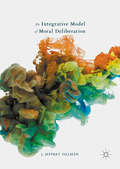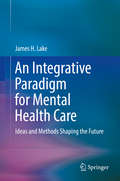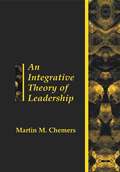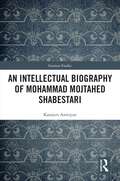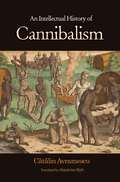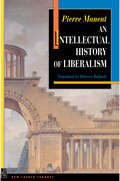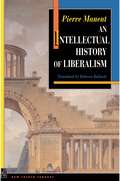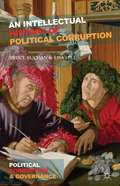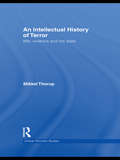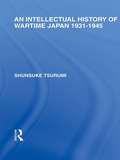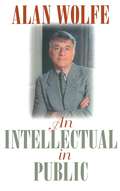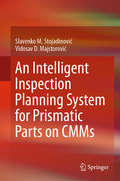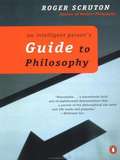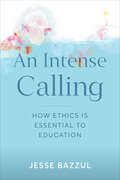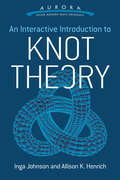- Table View
- List View
An Integrative Approach to Counseling: Bridging Chinese Thought, Evolutionary Theory, and Stress Management
by Robert G. SanteeAn Integrative Approach to Counseling: Bridging Chinese Thought, Evolutionary Theory, and Stress Management offers a global and integrative approach to counseling that incorporates multiple concepts and techniques from both eastern and western perspectives. The book identifies commonalities rather than the differences between them. The book also compares and contrasts the underlying cultural assumptions of western counseling with those of the Chinese perspectives of Confucianism, Daoism, and Buddhism, relative to integrating and applying a more global approach to helping individuals functionally adapt to challenges in their environments. The book will be used by faculty and students in those advanced undergraduate and graduate courses in psychology, counseling, or social work that cover such areas as introduction to counseling, counseling skills and techniques, counseling theories, multi-cultural awareness and counseling, and stress management.
An Integrative Approach to Healing Complex and Transgenerational Trauma: Psychotherapy and the Soul
by Isaac PizerThis book presents an integrative relational approach to treating trauma and psychological entanglements through autobiographical, philosophical and clinical reflections on the transgenerational dimension of the human experience and the self as an irreducible core of the person.The book commences with the author’s own journey growing up in a Jewish family deeply affected by transgenerational trauma from the Holocaust, providing an inspiring and reflective backdrop to this book’s contents. Isaac Pizer then describes and explains his philosophy of therapy, which holds psychotherapy and the treatment of trauma as a relational process that requires an inclusive awareness of the following dimensions of human experiencing: the physical, intrapsychic, relational, transgenerational, transpersonal. Exploring a psychotherapy that holds and integrates transgenerational awareness in the treatment of complex trauma, this book is supplemented with case studies and the author’s own experiences.This compelling and thought-provoking book is intended for therapists, therapists in training and people seeking knowledge and encouragement in their journeys of personal and collective healing, self-realisation and personal growth.
An Integrative Approach to Leader Development: Connecting Adult Development, Identity, and Expertise
by David V. Day Michelle M. Harrison Stanley M. HalpinThis book is a beginning, a first step, in taking leader development in organizations beyond conventional wisdom toward a scientifically sound research-based set of principles and practices. The authors looked beyond their own academic disciplines to bring to bear accumulated wisdom from researchers who have developed well-established and accepted
An Integrative Approach to Successional Dynamics
by Meiners, Scott J. and Pickett, Steward T. A. and Cadenasso, Mary L. Scott J. Meiners Pickett, Steward T. A. Mary L. CadenassoMuch of what is considered conventional wisdom about succession is not as clear cut as it is generally believed. Yet, the importance of succession in ecology is undisputed since it offers a real insight into the dynamics and structure of all plant communities. Part monograph and part conceptual treatise, An Integrative Approach to Successional Dynamics presents a unifying conceptual framework for dynamic plant communities and uses a unique long-term data set to explore the utility of that framework. The fourteen chapters, each written in a nontechnical style and accompanied by numerous illustrations and examples, cover diverse aspects of succession, including: community, population and disturbance dynamics, diversity, community assembly, heterogeneity, functional ecology and biological invasion. This unique text will be a great source of reference for researchers and graduate students in ecology and plant biology and others with an interest in the subject.
An Integrative Approach to Therapy and Supervision: A Practical Guide for Counsellors and Psychotherapists
by Mary Harris Anne BrockbankAn Integrative Approach to Therapy and Supervision presents an innovative and flexible model for therapy and supervision practice. The model draws on ideas from the psychological traditions of Transactional Analysis, Gestalt theory and Cognitive Behavioural Therapy to develop an integrated approach to working with clients and to developing a supervisor-supervisee relationship that can be adapted to suit the needs of individual personalities and situations. The authors lay out the theory underlying the model, how it relates to existing models of supervision, and demonstrate how the model works in practice using case material to illustrate the range of approaches that can be applied in a given scenario. This book is essential reading for both new and experienced practitioners, as well as those responsible for training therapists, counsellors and supervisors.
An Integrative Approach to Treating Babies and Children: A Multidisciplinary Guide
by Michael Shea Franklyn Sills Ann Diamond Weinstein John Wilks Anita Hegerty David Haas Dr Carolyn Goh Graham Kennedy Matthew Appleton Professor Franz Ruppert Thomas HarmsWorking with babies and children is most successful when therapists have a complete understanding and overview of all appropriate treatment options, and the effects of early influences on child health and development. This book shows therapists how to consider these factors in order to work more effectively within their individual areas of expertise. Contributors from a wide range of disciplines explore the influence of pregnancy, birth and family dynamics on the physical and mental health of babies and children. They show how these factors relate to common complaints, such as excessive and different types of crying, chronic illnesses and poor immune systems, and behavioural and attachment issues, and how complementary approaches can be best applied to treat these issues. This book also offers helpful advice for working within multidisciplinary teams. Illustrated with case studies and including examples from current research, this book is a valuable resource for therapists from diverse disciplines.
An Integrative Approach to Treating Eating Disorders: 9 Foundational Skills for a Lasting Recovery
by Bethany C. CrowleyAn Integrative Approach to Treating Eating Disorders walks therapists through how to effectively resolve the most common yet nuanced struggles that clients with disordered eating face on a daily basis.This straightforward workbook begins by demystifying the complexities and nuances of eating disorders. It then helps therapists understand the need for an integrative approach and walks them through how to assess a client’s biological, psychological, social, and spiritual domains as they correlate with disordered eating behaviors and thoughts. This is accomplished with the BASIC I.D. assessment model and a multimodal therapy framework, both created by Dr. Arnold Lazarus. Nine foundational skills are provided for clients to achieve lasting recovery and avoid the all-too-common relapse rate of eating disorders.Each foundational skill is presented in its own chapter, complete with data, case vignettes, worksheets, and exercises developed over twenty years of research and client management. With this book, therapists both new and experienced will boost their confidence, gain practical tools, and bring more efficiency to their individual or group sessions.
An Integrative Habit of Mind: John Henry Newman on the Path to Wisdom
by Frederick AquinoSearching for better ways to inspire people to pursue wisdom, Frederick D. Aquino argues that teachers and researchers should focus less on state-of-the-art techniques and learning outcomes and instead pay more attention to the intellectual formation of their students. We should, Aquino contends, encourage the development of an integrative habit of mind, which entails cultivating the capacity to grasp how various pieces of data and areas of inquiry fit together and to understand how to apply this information to new situations. To fully explore this notion, An Integrative Habit of Mind brings the work of the great religious figure and educator John Henry Newman into fruitful conversation with recent philosophical developments in epistemology, cognition, and education. Aquino unearths some crucial but neglected themes from NewmanÆs writings and carries them forward into the contemporary context, revealing how his ideas can help us broaden our horizons, render apt judgments, and better understand our world and how we think about it.
An Integrative Model of Moral Deliberation
by J. Jeffrey TillmanAn Integrative Model of Moral Deliberation suggests that the inadequacy of models of moral deliberation to deal effectively with contemporary moral complexity is a result of the lack of an inadequate theory of moral cognition. Drawing from work in neuroscience, evolutionary psychology, social theory, dual process cognitive theory, and the work of William James, this book develops a theory of moral cognition to be used as the basis for a model of moral deliberation. This model portrays moral deliberation as a back and forth movement between intuitive and analytic cognitions, by which narrative scenarios are constructed and then assessed by aesthetic sensibilities.
An Integrative Paradigm for Mental Health Care: Ideas and Methods Shaping the Future
by James H. LakeThis crucial volume provides a concise overview of the conceptual foundations and clinical methods underlying the rapidly emerging subspecialty of integrative mental healthcare. It discusses methods for guiding practitioners to individualized integrative strategies that address unique symptoms and circumstances for each patient and includes practical clinical techniques for developing interventions addressed at wellness, prevention, and treatment. Included among the overview:Meeting the challenges of mental illness through integrative mental health care.Evolving paradigms and their impact on mental health careModels of consciousness: How they shape understandings of normal mental functioning and mental illnessFoundations of methodology in integrative mental health careTreatment planning in integrative mental health careThe future of mental health careA New Paradigm for Integrative Mental Healthcare is relevant and timely for the increasing numbers of patients seeking integrative and alternative care for depressed mood, anxiety, ADHD, bipolar disorder, schizophrenia, and other mental health problems such as fatigue and chronic pain. “Patients are crying out for a more integrative approach, and this exemplary book provides the template for achieving such a vision.” -Jerome Sarris, MHSc, PhD, ND“For most conventionally trained clinicians the challenge is not “does CAM work?” but “how do I integrate CAM into my clinical practice?” Lake’s comprehensive approach answers this central question, enabling the clinician to plan truly integrative and effective care for the mind and body.”-Leslie Korn, PhD, MPH
An Integrative Theory of Leadership (Social Psychology Ser.)
by Martin ChemersA definition of leadership that would be widely accepted by the majority of theorists and researchers might say that "leadership is a process of social influence in which one person is able to enlist the aid and support of others in the accomplishment of a common task." The major points of this definition are that leadership is a group activity, is based on social influence, and revolves around a common task. While this specification seems relatively simple, the reality of leadership is very complex. Intrapersonal factors (thoughts and emotions) interact with interpersonal processes (attraction, communication, and influence) to have effects on a dynamic external environment. Each of these aspects brings complexity to the leadership process. It is the purpose of this book to make that complexity a bit more manageable, increasing the ability to understand what effective leadership is. This volume offers a comprehensive analysis and integration of the empirical research literature and major theories of leadership. It employs a functional analysis stressing what leaders must do to be effective and specifies the processes related to each function. The chapters provide an extensive review of the major approaches to leadership. Each chapter is discussed with an eye to explaining the basic principles, the research evidence, and where appropriate, the relationship of the theory or research program to other theories. In addition, this volume offers the most comprehensive treatment of cultural and gender factors in leadership of any recent book. The question of male-female differences in leadership style and performance is carefully analyzed against the empirical findings. The ultimate goal of this review of the literature is to provide a basis for the presentation of an integrative model of leadership that brings together function and process and provides an armature for integrating what is known.
An Intellectual Biography of Mohammad Mojtahed Shabestari (Iranian Studies)
by Katajun AmirpurThis monograph details the life and ideas of Mohammad Mojtahed Shabestari, the leading representative of secular Islam among the Iranian clergy and a pioneer of the Post-Islamist Movements in Iran.Shabestari stands as the leading representative of secular Islam among the Iranian clergy, advocating for a progressive interpretation of Islamic thought that aligns with modern secular values. This biography delves into Shabestari's intellectual journey, tracing his evolution from a traditional cleric to a pioneering figure in the Post-Islamist Movements in Iran. The book meticulously examines Shabestari's philosophical and theological contributions, highlighting his efforts to reconcile faith with reason and democracy. It provides an in-depth analysis of his seminal works, illustrating his critical stance on authoritarian interpretations of Islam and his advocacy for human rights and individual freedoms within an Islamic framework. By shedding light on his unique perspectives and the socio-political context in which he operates, this biography offers readers a nuanced understanding of Shabestari's impact on contemporary Islamic thought and the broader movement towards secularism in Iran.The book is an essential read for those interested in Middle Eastern studies, Islamic theology, and the ongoing discourse on the role of religion in modern society.
An Intellectual History of Cannibalism
by Cătălin AvramescuThe cannibal has played a surprisingly important role in the history of thought--perhaps the ultimate symbol of savagery and degradation-- haunting the Western imagination since before the Age of Discovery, when Europeans first encountered genuine cannibals and related horrible stories of shipwrecked travelers eating each other. An Intellectual History of Cannibalism is the first book to systematically examine the role of the cannibal in the arguments of philosophers, from the classical period to modern disputes about such wide-ranging issues as vegetarianism and the right to private property. Catalin Avramescu shows how the cannibal is, before anything else, a theoretical creature, one whose fate sheds light on the decline of theories of natural law, the emergence of modernity, and contemporary notions about good and evil. This provocative history of ideas traces the cannibal's appearance throughout Western thought, first as a creature springing from the menagerie of natural law, later as a diabolical retort to theological dogmas about the resurrection of the body, and finally to present-day social, ethical, and political debates in which the cannibal is viewed through the lens of anthropology or invoked in the service of moral relativism. Ultimately, An Intellectual History of Cannibalism is the story of the birth of modernity and of the philosophies of culture that arose in the wake of the Enlightenment. It is a book that lays bare the darker fears and impulses that course through the Western intellectual tradition.
An Intellectual History of Liberalism
by Pierre Manent Rebecca BalinskiHighlighting the social tensions that confront the liberal tradition, Pierre Manent draws a portrait of what we, citizens of modern liberal democracies, have become. For Manent, a discussion of liberalism encompasses the foundations of modern society, its secularism, its individualism, and its conception of rights. The frequent incapacity of the morally neutral, democratic state to further social causes, he argues, derives from the liberal stance that political life does not serve a higher purpose. Through quick-moving, highly synthetic essays, he explores the development of liberal thinking in terms of a single theme: the decline of theological politics. The author traces the liberal stance to Machiavelli, who, in seeking to divorce everyday life from the pervasive influence of the Catholic church, separated politics from all notions of a cosmological order. What followed, as Manent demonstrates in his analyses of Locke, Hobbes, Rousseau, Guizot, and Constant, was the evolving concept of an individual with no goals outside the confines of the self and a state with no purpose but to prevent individuals from dominating one another. Weighing both the positive and negative effects of such a political arrangement, Manent raises important questions about the fundamental political issues of the day, among them the possibility of individual rights being reconciled with the necessary demands of political organization, and the desirability of a government system neutral about religion but not about public morals.
An Intellectual History of Liberalism (New French Thought Series #1)
by Pierre ManentHighlighting the social tensions that confront the liberal tradition, Pierre Manent draws a portrait of what we, citizens of modern liberal democracies, have become. For Manent, a discussion of liberalism encompasses the foundations of modern society, its secularism, its individualism, and its conception of rights. The frequent incapacity of the morally neutral, democratic state to further social causes, he argues, derives from the liberal stance that political life does not serve a higher purpose. Through quick-moving, highly synthetic essays, he explores the development of liberal thinking in terms of a single theme: the decline of theological politics. The author traces the liberal stance to Machiavelli, who, in seeking to divorce everyday life from the pervasive influence of the Catholic church, separated politics from all notions of a cosmological order. What followed, as Manent demonstrates in his analyses of Locke, Hobbes, Rousseau, Guizot, and Constant, was the evolving concept of an individual with no goals outside the confines of the self and a state with no purpose but to prevent individuals from dominating one another. Weighing both the positive and negative effects of such a political arrangement, Manent raises important questions about the fundamental political issues of the day, among them the possibility of individual rights being reconciled with the necessary demands of political organization, and the desirability of a government system neutral about religion but not about public morals.
An Intellectual History of Political Corruption
by Lisa Hill Bruce BuchanFew concepts have witnessed a more dramatic resurgence of interest in recent year than corruption. It is, however, a concept that dates back to antiquity with this recent popularity representing the latest iteration in a long history of contestation over corruption. In one of the first surveys of the variable contours of meaning invested in the term, from antiquity through to the end of the eighteenth century, this book explores the significant role corruption has played in political discourse through the centuries. It finds that corruption was not always a concept particular to the abuse of public office, but was often applied to more nebulous fears of moral, spiritual and physical degeneration. This book marshals both historical and conceptual analysis to demonstrate a conceptual oscillation between restrictive 'public office' and expansive 'degenerative' connotations of corruption that persisted until the second half of the eighteenth century when the public office conception overtook and finally superseded the degenerative one. The result is a survey that is fundamental to the understanding of modern ideas of corruption and represents an invaluable tool to both students and scholars of the subject.
An Intellectual History of Terror: War, Violence and the State (Routledge Critical Terrorism Studies)
by Mikkel ThorupThis book investigates terrorism and anti-terrorism as related and interacting phenomena, undertaking a simultaneous reading of terrorist and statist ideologists in order to reconstruct the 'deadly dialogue' between them. This work investigates an extensive array of violent phenomena and actors, trying to broaden the scope and ambition of the history of terrorism studies. It combines an extensive reading of state and terrorist discourse from various sources with theorizing of modernity's political, institutional and ideological development, forms of violence, and its guiding images of self and other, order and disorder. Chapters explore groups of actors (terrorists, pirates, partisans, anarchists, Islamists, neo-Nazis, revolutionaries, soldiers, politicians, scholars) as well as a broad empirical source material, and combine them into a narrative of how our ideas and concepts of state, terrorism, order, disorder, territory, violence and others came about and influence the struggle between the modern state and its challengers. The main focus is on how the state and its challengers have conceptualized and legitimated themselves, defended their existence and, most importantly, their violence. In doing so, the book situates terrorism and anti-terrorism within modernity's grander history of state, war, ideology and violence. This book will be of much interest to students of critical terrorism studies, political violence, sociology, philosophy, and Security Studies/IR in genera Mikkel Thorup is Assistant Professor at the Institute of Philosophy and the History of Ideas, University of Aarhus, Denmark.
An Intellectual History of Wartime Japan: 1931-1945 (Routledge Library Editions: Japan)
by Shunsuke TsurumiWhen this book was published in Japanese in 1982 it was awarded the prestigious Jiro Osaragi Prize. It is an important contribution to the understanding of the mental and spiritual world of Japan just over two generations ago. The author argues that just as the period of isolation up to the middle of the 19th century was crucial for Japan’s development, so the Second World War represented another crucial period for the country. These years were a period of intellectual isolation during which significant development took place.
An Intellectual in Public
by Alan WolfeA new collection of essays from one of the most courageous and honest thinkers writing today "The question of the public intellectual is very much in the air again," writes Alan Wolfe. As one of our eminent social commentators, Wolfe should know; he's been writing, with fierce intellectual independence, about American public and private life since the 1960s. In this new collection of essays spanning seven years of contributions to The New Republic, The New Yorker, Atlantic Monthly, and other prominent publications, Wolfe displays the courage necessary to write honestly--yet free of ideology, cant, and piety--about the things Americans take very seriously. Wolfe thinks big; indeed, the essays in An Intellectual in Public confront many of the most controversial issues of our time: country, God, race, sex, material consumption, and left and right. Beginning and ending the book are original essays describing the public intellectual's role, and how Wolfe believes that role ought to be filled. An Intellectual in Public is not only a demonstration of Wolfe's pointed analytical skills but a testament to his belief that "severely ideological thinking" is inappropriate for some of our most difficult problems, and that "neither the right nor the left can speak for all of America. " Alan Wolfe is the director of the Boisi Center for Religion and American Public Life and also Professor of Political Science at Boston College. He is the author of over a dozen books, including One Nation After All: What Middle Class Americans Really Think About: God, Country, Family, Racism, Welfare, Immigration, Homosexuality, Work, the Right, the Left and Each Other.
An Intelligence in Our Image: The Risks of Bias and Errors in Artificial Intelligence
by William Welser Iv Osonde A. OsobaMachine learning algorithms and artificial intelligence influence many aspects of life today and have gained an aura of objectivity and infallibility. The use of these tools introduces a new level of risk and complexity in policy. This report illustrates some of the shortcomings of algorithmic decisionmaking, identifies key themes around the problem of algorithmic errors and bias, and examines some approaches for combating these problems.
An Intelligent Customer Complaint Management System with Application to the Transport and Logistics Industry (Springer Theses)
by Alireza FaedThis thesis addresses the issue of customer complaints in the context of Customer Relationship Management (CRM). After a comprehensive survey of the current literature on CRM, the thesis describes the development of a new intelligent CRM (I-CRM) framework, which integrates text analytics, type mapping, SPSS, structural equation modeling, and linear and fuzzy approaches. This new methodology, in contrast to previous ones, is able to handle customer complaints with respect to different variables, thus allowing organizations to find their key customers and key complaints, and to address and provide solution to the major complaints of the key customers, hence promoting business development. The thesis also describes the successful application of the method to a real-world case, represented by the immeasurable truck drivers complaints at the Fremantle port in Western Australia.
An Intelligent Inspection Planning System for Prismatic Parts on CMMs
by Vidosav D. Majstorović Slavenko M. StojadinovićThis book examines an intelligent system for the inspection planning of prismatic parts on coordinate measuring machines (CMMs). The content focuses on four main elements: the engineering ontology, the model of inspection planning for prismatic parts on CMMs, the optimisation model of the measuring path based on an ant-colony approach, and the model of probe configuration and setup planning based on a genetic algorithm. The model of inspection planning for CMMs developed here addresses inspection feature construction, the sampling strategy, probe accessibility analysis, automated collision-free operation, and probe path planning. The proposed model offers a novel approach to intelligent inspection, while also minimizing human involvement (and thus the risk of human error) through intelligent planning of the probe configuration and part setup. The advantages of this approach include: reduced preparation times due to the automatic generation of a measuring protocol; potential optimisation of the measuring probe path, i.e., less time needed for the actual measurement; and increased planning process autonomy through minimal human involvement in the setup analysis and probe configuration.
An Intelligent Person's Guide to Philosophy
by Roger Scruton"Philosophy's the 'love of wisdom', can be approached in two ways: by doing it, or by studying how it has been done," so writes the eminent philosopher Roger Scruton. In this user-friendly book, he chooses to introduce philosophy by doing it. Taking the discipline beyond theory and "intellectualism," he presents it in an empirical, accessible, and practical light. The result is not a history of the field but a vivid, energetic, and personal account to guide the reader making his or her own venture into philosophy. Addressing a range of subjects from freedom, God, reality, and morality, to sex, music, and history, Scruton argues philosophy's relevance not just to intellectual questions, but to contemporary life. .
An Intense Calling: How Ethics Is Essential to Education
by Jesse BazzulPositing that education is a movement from one way of being to another, more desirable one, An Intense Calling argues that ethics should be the prime focus for the field of education. The book locates ethics, education, and justice in human subjectivity and describes education as a necessary practice for ethical reflexivity, change, and becoming (ethically) different. It also situates ethics as something that exceeds subjectivity, thereby engaging ethics as a material phenomenon through topics such as aesthetics and solidarity with non-humans. Jesse Bazzul explores various concepts in the book including power, biopolitics, the commons, subjectivity, and materiality, and draws from over twenty years of experience teaching in different countries including Canada, Ireland, the United States, China, and Ukraine. Taking a wide-ranging philosophical approach, the book entangles ethics, urgent political issues, and pressing educational contexts of the twenty-first century. In doing so, An Intense Calling maintains that ethics is the core of education because education involves finding better ways of living and being in the world.
An Interactive Introduction to Knot Theory
by Allison K. Henrich Inga JohnsonThis well-written and engaging volume, intended for undergraduates, introduces knot theory, an area of growing interest in contemporary mathematics. The hands-on approach features many exercises to be completed by readers. Prerequisites are only a basic familiarity with linear algebra and a willingness to explore the subject in a hands-on manner.The opening chapter offers activities that explore the world of knots and links — including games with knots — and invites the reader to generate their own questions in knot theory. Subsequent chapters guide the reader to discover the formal definition of a knot, families of knots and links, and various knot notations. Additional topics include combinatorial knot invariants, knot polynomials, unknotting operations, and virtual knots.
